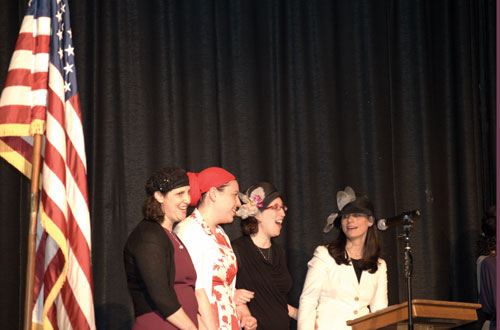.jpg)
Riverdale—In an historic moment for the world Orthodox Jewish community, the first-ever Manhigei Hilchatit Ruchanit Toranit, or Maharats, were ordained on June 16 in the Ramaz Upper School. Graduates Ruth Balinsky Friedman, Rachel Kohl Finegold and Abby Brown Scheier will all be taking on positions of halakhic and spiritual leadership as a result of their years at Maharat.
“I want to be something that is a feminine, new form of religious leadership,” Finegold said. Finegold, who will be joining Congregation Shaar Hashomayim in Montreal as the director of education and spiritual enrichment, had completed years of religious study, but didn’t feel that she had the correct level of education needed to be seen as a religious leader.
“Getting a credential that clearly says what I am helps people know that they can come to me and that I’m there as a religious resource,” Finegold said after explaining that she didn’t want to be stuck sending community members to her husband, a rabbi, every time they had a question.
Along with Scheier, Finegold took classes at Maharat via webcam rather than attending classes in the school building. Their curriculum over the four-year course consisted of Talmud, halakhic decision making, pastoral counseling, and leadership skills—everything a man would need in order to obtain smicha, and possibly more.
“The goal of the curriculum,” studied by the three graduates and the 13 students still in their freshmen-junior years,“is to help spiritual leaders become adept at reaching out to others in a sensitive and psychologically sophisticated manner and to be a source of guidance and wise counsel in a wide range of settings—congregations, schools, universities, hospitals, Jewish agencies,” said Esther Altmann, director of pastoral studies.
The students’ halakha teacher and rosh yeshiva, along with the school’s co-founder and dean, Rabba Sara Hurwitz, spent time over the last few years visiting religious communities and cultivating relationships by “painting a picture for the community about what an Orthodox female leader looks like,” as Hurwitz puts it, so that they could blaze a trail for the first three graduates to have jobs.
Hurwitz started Maharat in 2009 along with Rabbi Avi Weiss, under whom Hurwitz studied for five years, after women at Hurwitz’s ordination ceremony approached and asked her how they could pursue similar career paths. Consequently, Hurwitz and Weiss took out an ad in the Jewish Week about the program and received 35 applicants.
One of those applicants, Friedman, who attended Barnard and the Drisha Institute for years, didn’t feel called to many professions until she saw Hurwitz at her 2009 ordination. “It was clear to me that this was the path that would reallywork and that I would really love to do,” Friedman said.
Those ordained this year and in the years to come will not be signing ketubahs, completing minyanim, or sitting on Batei Din. Though the position of a Maharat is functionally similar to that of a rabbi, the Orthodox views of the position and the women who were ordained stick to the male/female differences in Jewish law.
The position of a Maharat as a spiritual and halakhic leader as separate from a rabbi was an “inevitable evolution,” according to Hurwitz. To finalize the evolution, each graduate was told by a rabbi of the school that they had “been found worthy and granted the authority to teach and determine halakhic rulings for the Jewish community and [had] been ordained as a spiritual leader.”
The three graduates, who with these ordinations will be taking on positions in Washington, D.C. and two separate Montreal synagogues, each took a few moments to thank their friends, family members and teachers at the ceremony. Weiss was particularly thanked for sticking out his neck and making the whole school happen.
Also thanked were the men—the “unsung heroes,” as Finegold put it—who believe in the idea of ordained female clergy and supported the school and students as opposed to the stance of many in the Orthodox community who continue to stand against the idea of female clergy.
“It took many years for the Orthodox community, or at least a small part of it, to mature to this moment,” said Rabbi Daniel Sperber, professor of Talmud at Bar Ilan University.
A special thanks was also offered to Blu Greenberg for founding the Jewish Orthodox Feminist Alliance, JOFA, which led to the creation of many learning institutions for women.
by Aliza Chasan











